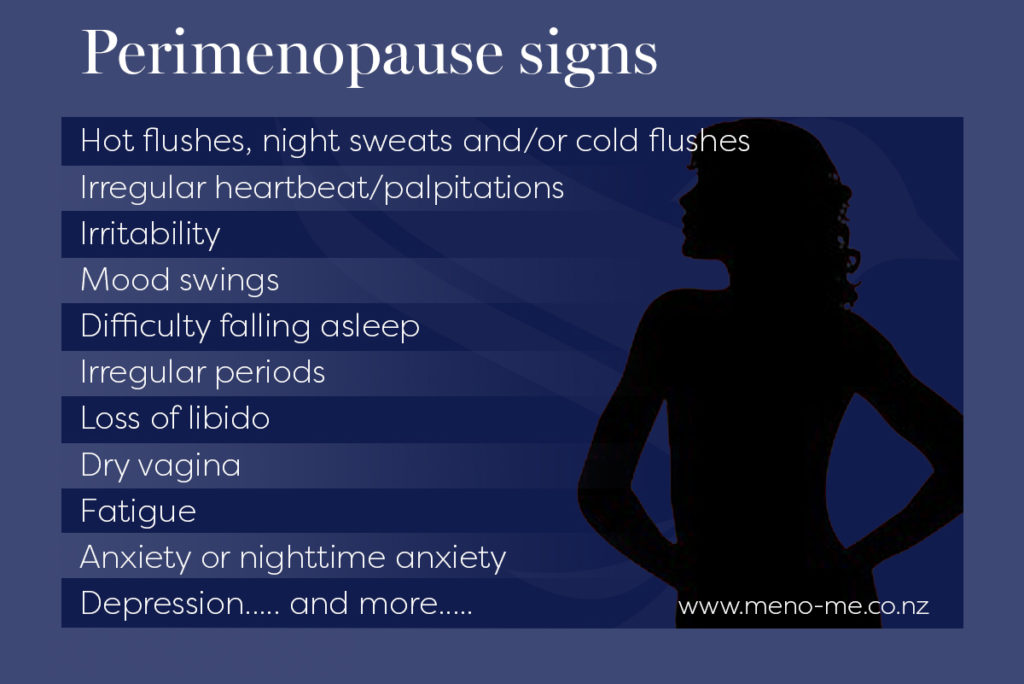The 34 Symptoms Of Perimenopause

The 34 recognised symptoms of perimenopause? Thirty-four and counting!
Indeed, if you’re reading this you’re probably searching for information on the hormonal changes of menopause. Moreover, it’s a sad fact that many of us are starved of good information and knowledge. So, let us enlighten you.
Table of Contents
The 40+ life stage
Many women believe that the age of 40-45 is too early for menopause. Or, if they don’t think this is true their doctor might! (We hear this far too often.)
And in a lot of cases, it’s true, it is early to go into menopause. In fact, if you go into menopause at the age of 40-45 it’s classified as early menopause.
But it’s the peri part of the equation that comes into play here. Since perimenopause (peri) is the first stage of menopause, or the lead-up to your last period it’s a major player.
Early to mid-40s is the average time for the symptoms of perimenopause to begin and it’s the stage when most symptoms occur*.
Meet peri
So once you hit this age (and in some cases your late 30s) many women may begin to experience the hormonal symptoms of perimenopause.
🔆 Although one caveat here is that many of the signs can also be precursors to pregnancy so please rule that out first.
Peri moves slowly
Unfortunately, a lot of women don’t have a clue that:
- change is happening
- it’s perimenopause.
What is perimenopause?
Perimenopause is the first stage of menopause.
It occurs during the lead-up (menopause is the cessation of fertility and periods) and can last on average four years.
Or, it can go on for over a decade. (Sorry!)
During these years, sex hormones such as estrogen and progesterone are declining.
While progesterone lessens in a more linear fashion, estrogen tends to fluctuate wildly.
As a result, the fluctuations and out-of-balance hormone ratios contribute to the characteristic symptoms of perimenopause.
Related: The Stages Of Menopause
Changes to your periods
Typically your menstrual cycles change during peri; becoming irregular, shorter or longer, or heavier or lighter.
The 34 most common symptoms of perimenopause:
1. Allergies
The hormones and the immune system are closely related so it’s not uncommon to experience an increase in allergies. While more research is needed, an increase in allergies is believed to be related to shifts in estrogen levels. In addition, xenoestrogens and environmental toxins may play a role1.
2. Anxiety
Anxiety is a feeling of constant worry and concern out of all proportion to normal feelings of everyday life. It can occur in perimenopause / menopause as altered estrogen levels can affect the brain. As a result, the production of feel good, calming neurotransmitters such as serotonin, dopamine and gamma-amma-butyric acid (GABA) may be impacted.
Related: Let’s Talk About Anxiety
3. Bloating
Perimenopausal women often experience an increase in bloating. Indeed, it can feel similar to PMS, that distended tummy and often (sorry) an increased incidence of burping or farting. What’s more, it can occur for many reasons including lowering estrogen levels and/or stomach acid as well as increased gut issues and food sensitivities.
4. Breast tenderness
Many of us have experienced the feeling of tender breasts during menstruation and/or pregnancy. And this is also a common sign of perimenopause and so – somewhat surprisingly – is an increase in breast size. The tenderness can be due to estrogen and progesterone ratios being out of kilter. This can be common during perimenopause with proportionally lower progesterone and higher estrogen.
5. Body odour changes
Although this sign is often a surprise, decreasing estrogen levels can cause the pH levels of the vagina to rise and reduced vaginal flora leading to an ammonia-like smell. Furthermore, this may also affect how your pee smells.
6. Brain fog
Difficulty concentrating, memory lapses (where have I put my keys?), and mental blocks can be a result of what is – quite literally – a feeling as if your brain is foggy. And as we have estrogen receptors all over the body and the brain is rich in them, lowering estrogen levels are believed to play a role here.
7. Burning mouth syndrome
Some perimenopausal women experience a sensation of ‘burning’ on the tongue, roof of the mouth or inside the lip area. Known as burning mouth syndrome (BMS) it’s mostly seen in females aged 40-602. BMS may also affect taste with some women saying they can experience a metallic taste.
8. Depression
Feelings of sadness and hopelessness often accompany perimenopause however, some experts say it’s not directly related to perimenopause. But other schools of thought say menopausal depression should become a subcategory of depression. What’s more, if you’ve experienced depression before it’s likely to come back in menopause and may be magnified.
9. Digestive issues
As mentioned under bloating, signs of gas along with cramping, constipation, acid reflux (GERD), and sometimes nausea can go hand in hand with perimenopause. Indeed, a healthy digestive system is populated with a diverse group of microbes (fungi, bacteria, and viruses) and the gut microbiome is one of the main regulators of circulating estrogen.
Related: Menopause & Gut Health
10. Dizziness
Furthermore, perimenopausal women can experience loss of balance, vertigo, a feeling of spinning, and/or dizzy spells. Although researchers don’t fully understand the connection it’s believed issues linked with the hormonal fluctuations of midlife and the middle ear, blood sugar levels, and migraines could be a cause.
Related: Dizziness At Peri Is Common
11. Electric shock sensation
While it might sound bizarre, some women report feeling an electric shock sensation (ESS) under their skin. They liken it to a feeling like a rubber band being flicked or a ‘jolt’. We couldn’t find much research on it but it’s possibly to do with estrogen’s association with the nervous system.
12. Fatigue
Feelings of extreme exhaustion or a complete loss of energy are one of the common signs of perimenopause. Indeed, as with many of the other symptoms of menopause, hormonal imbalances are the major culprit. These characteristic hormonal changes will also interrupt your normal sleep pattern. Therefore, the resulting sleeplessness can cause fatigue during the day.
13. Feelings Of dread
Often located in the pit of the stomach, we feel dread for no apparent reason. Unfortunately, a sense of impending doom can go side by side with perimenopause. Moreover, they often accompany anxiety, mood swings, and hot flushes which can magnify the feelings. Again, this is due to hormonal changes and should settle down with time.
14. Formication
Some perimenopausal women report feeling like they have bugs crawling on their arms and legs. This is known as formication and although they ‘feel’ it there is nothing physically apparent. Formication can lead to itchy skin and is associated with anxiety, fibromyalgia, and several other conditions. And lowering estrogen levels are believed to be behind it during perimenopause.
15. Hot flushes
This is probably the most infamous symptom of menopause recognisable by the heating up of the body/face and red flushing of the skin. Further, hot flushes can last for several years. They occur when the body’s natural thermostat goes awry due to hormonal fluctuations and in the brain’s bid to get everything back to normal this heat regulator causes a heatwave and sweating. Stress, spicy foods, caffeine, sugar and alcohol can be triggers.
Related: Hot Flushes, Why Do They Happen?
16. Hair changes
An extremely frustrating symptom, thinning hair on the head and other parts of the body along with an increase in facial hair are common. The hormonal shifts of menopause can cause a shortening or lengthening of the hair growth cycle. Additionally, the hair follicle also changes and may become smaller in what is known as follicular miniaturisation. Indeed, estrogen and progesterone encourage growth and longevity. When their levels diminish during menopause, hair growth slows, and hair loss becomes more pronounced.
Related: How You Can Have Thicker, Denser Hair At Perimenopause
17. Headaches / migraines
Hormonal headaches and migraines really are a ‘thing’. And even if you’ve never experienced them during your period they can rear their heads (pardon the pun) or become more frequent in peri. However, the good news is they should settle down once you’re in post-menopause.
Related: Why You’ve Got A Headache
18. Incontinence/urinary tract infections (UTIs)
Urinary incontinence is seldom discussed because bladder leakage and control are one of those ‘shhh’ signs. But they’re very real and can be especially distressing. You could choose a pelvic floor trainer to help or Kegel exercises are also extremely helpful. However, most of us don’t do them correctly. There are also laser medical treatments available. Learn more about them on episode #105 of the Women On Fire podcast UTIs may also become more common due to lowered pH in the vagina. Research shows that the supplement D-Mannose may be as effective as antibiotics for treating this. This is extremely good news as antibiotic use can disrupt gut flora.
19. Insomnia
Along with sleep disruption and night sweats insomnia can become an issue during perimenopause. In fact, studies have shown this can affect 50% of women in perimenopause. It’s to do with the pineal gland in the brain that works with our circadian rhythm or our 24-7 sleep/wake cycle. Furthermore, this gland also releases the hormone melatonin which helps the body realise it’s time to prepare for sleep around 9pm. However, hormonal shifts and lifestyle habits can disrupt this.
Related: Your Free Sleep Hygiene Sheet
20. Irregular or rapid heartbeat
This one gives new meaning to the phrase ‘be still my beating heart’, but it’s quite a common perimenopausal sign. As with so many of the signs and symptoms of perimenopause the decline of estrogen is usually behind it as lower levels of have a direct effect on the heart and blood pressure. As a result, the stress hormone cortisol rises and heart palpitations can be one of the by-products of high cortisol.
21. Irregular periods
Menstrual irregularity is often the first sign of perimenopause. Indeed, periods may become shorter or longer, lighter or heavier. And in some instances women may experience extremely heavy bleeding during their period. A typical menstrual cycle is defined as ranging from 21-35 days with menstrual flow lasting for 3-5 days. The definition of irregular periods is when a woman experiences an alteration in their typical menstrual cycle that continue for several months.
22. Irritability or rage
There are many comedic memes out there about this one, but all laughter aside it’s a common fact that perimenopausal women often become very irritable. And rage is one of the thornier aspects of perimenopause – one that’s not always acknowledged. Fluctuating estrogen can unbalance the production of the feel-good neurotransmitter serotonin so every time the level of estrogen shifts it throws serotonin levels off-kilter. Therefore, you may go through periods of calm between the rage.
Related: How To Deal With Menopausal Rage
23. Itchy skin
It’s not talked about often, probably because people don’t associate it with hormone imbalance, but itchy skin can definitely be a side effect of perimenopause. Chronic itchy skin is technically known as ‘pruritus’, and it can be caused by the hormonal changes of perimenopause. As estrogen contributes to the production of collagen in the skin, lowering levels mean your skin is producing less collagen. For this reason, it becomes thinner and produces less natural oils and it becomes drier. Hence itchy skin on your arms, legs, chest, back, and butt (even the vah-jay-jay, sorry ladies).
24. Joint pain
Unfortunately, many women put this down to overexercise or exercise and don’t connect the dots that it’s a common sign of perimenopause. However, estrogen plays an important role in maintaining joint and bone health. It acts as an anti-inflammatory and regulates fluid levels in the body and lower estrogen leads to dehydration which can cause uric acid levels to increase causing joint pain.
25. Loss of libido
Not feeling ‘in the mood’ is common during peri. In fact, it can affect 20-40% of women. Annoying? Definitely. In most cases, a lower libido during menopause is due to decreased hormone levels. A decrease in estrogen and progesterone production can negatively impact a woman’s desire for sex. These decreased hormone levels can also lead to vaginal dryness and tightness, which can cause pain during sex. And estrogen plays a vital role in female sexuality by increasing sensation, assisting in the production of vaginal lubrication, and maintaining the health of vaginal tissue.
26. Mood swings
Tears, joy, irritability, rage – the pendulum can swing back and forth with perimenopausal women. Not surprisingly, they’re caused largely by the hormonal transitions women go through during this time.
Hormones, such as estrogen, influence the production of serotonin, which is a mood-regulating neurotransmitter. Furthermore, other menopause signs – such as hot flushes, night sweats, physical changes, and fatigue – can cause or intensify mood swings, but these signs are generally caused by hormonal imbalance as well.
27. Muscle tension
A feeling of increased muscle tension or pain may not be due to your workout but a result of hormonal fluctuation. One of estrogen’s roles is to regulate the stress hormone cortisol so as estrogen declines during menopause cortisol increases. In addition, we have lower progesterone levels which drop significantly in our 30s – progesterone is often called ‘Nature’s Valium. The lower estrogen also means we don’t utilise magnesium as well which is notable because it plays a key role in the contraction and relaxation of muscles. And put the three together – low estrogen, progesterone and magnesium plus high cortisol for an extended period of time and you’ve got a perfect storm for muscle tension and cramping.
28. Night sweats
A night sweat during menopause means you are having a hot flush while you are asleep in bed. As a result you can wake up drenched and chilly. Fluctuating estrogen levels cause a part of the brain that regulates body temperature to become confused. So like a faulty thermostat, it responds to these fluctuations as if it’s sensing an increase in body temperature. Therefore, in an attempt to cool you down it causes your blood vessels to dilate, creating a hot flush, thus triggering sweat glands to produce sudden perspiration. When this happens while you’re asleep it’s called a night sweat. Something that may wake you and lead to broken sleep.
29. Oral problems
Some people experience increased problems with bleeding gums and tooth loss in perimenopause. Once again, declining levels of estrogen can affect the gums, teeth, and overall oral health. For this reason, you may experience bleeding and/or receding gums, dry mouth, weakened teeth, and gingivitis. What’s more, the taste buds can also experience change and cause you to crave sugar and sweet foods or make some food and drink taste highly sugary, salty, or metallic. In addition, a dry mouth (xerostomia) can also occur.
30. Paresthesia
It’s an unusual word, isn’t it? It’s also known as ‘tingling extremities’ because it’s a sensation often felt in the hands, arms, feet, and legs. And it can feel like numbness or ‘pins and needles’. Indeed, when estrogen is thrown off balance during perimenopause it can affect the nervous system. What’s more depleted estrogen levels also lead to thinner skin which is more susceptible to cracking and wrinkling. Therefore, the weaker skin may become sensitive and can also be associated with tingling or numb sensations.
Related: What Is Paresthesia?
31. Vaginal dryness
Because estrogen levels drop during menopause, a lessening of the vaginal ‘mucosa’ leads to vaginal dryness. This can have a direct effect on our pelvic health. So we may begin to experience decreased lubrication, lesser elasticity, and an altered vaginal pH leading to changes in odour and susceptibility to bladder infections, decreased pelvic floor strength, and urinary incontinence.
32. Weakened fingernails
The hormonal fluctuations associated with perimenopause can limit the body’s ability to produce keratin, resulting in brittle fingernails and toenails. Indeed, fingernails that have always been strong and sturdy are likely to weaken and slow down their growth during the meno years.
33. Weight gain
One of the biggest bugbears of women at this age is weight gain. While it may be due to both hormonal and metabolic changes, it’s not necessarily directly linked with perimenopause itself. Gut health, stress, growing older, thyroid, insulin, sleep, liver health, nutrition, and movement all play a role as well. However, the changes of menopause will see a redistribution of body fat with a natural tendency for more to be stored in the abdomen area. And a small gain of around 2kg is considered average.
34. Osteoporosis
This becomes a serious risk for women at menopause. Osteoporosis (meaning porous bone) is a skeletal disease characterised by weakened bones and an increased risk of bone fractures. The prevalence of osteoporosis is on the increase and affects more than half of women over 60. We lose bone mass two to four times faster after menopause – 10 percent of it in the first five years of post-menopause.
Related: Why Strong Bones Are Important
For more detailed symptom information click here.
**It’s important to remember that every woman’s body is different so we are talking average statistics here.
Conclusion
As more light shines on perimenopause and menopause, more symptoms are being recognised.
For this reason, you may see lists of 40, 66 or even 100 Symptoms Of Perimenopause.
So we’ve chosen to focus on the 34 most common and well-recognised symptoms of perimenopause in this particular piece. The truth is, we don’t want to overwhelm you!
We hope this helps you wade through the, often confusing, changes of this life stage. Having been there, we know what a rollercoaster perimenopause can be. And please don’t hesitate to reach out here if you have any questions or if you want us to include 66 or 100 Symptoms Of Perimenopause. 😀
Disclaimer: This article should never take the place of medical advice. Perimenopausal signs could also be indicative of some other conditions such as pregnancy and various disorders so please see your GP to rule them out.
Share with a friend
Sign up to our mailing list for the latest news and stories and receive a $5 discount code to redeem on your first purchase, plus receive a 3 step eBook on ways to support your body through menopause…
This site is protected by reCAPTCHA and the Google Privacy Policy and Terms of Service apply.

Natural Menopause Support
Our natural herbal formulation is evidence-based to support women in all stages of menopause
Related Posts
References:
- Bonds RS, Midoro-Horiuti T. Estrogen effects in allergy and asthma. Curr Opin Allergy Clin Immunol. 2013 Feb;13(1):92-9. doi: 10.1097/ACI.0b013e32835a6dd6. PMID: 23090385; PMCID: PMC3537328.ric
- Cerchiari DP, de Moricz RD, Sanjar FA, Rapoport PB, Moretti G, Guerra MM. Burning mouth syndrome: etiology. Braz J Otorhinolaryngol. 2006 May-Jun;72(3):419-23. doi: 10.1016/s1808-8694(15)30979-4. PMID: 17119782; PMCID: PMC9443579.








